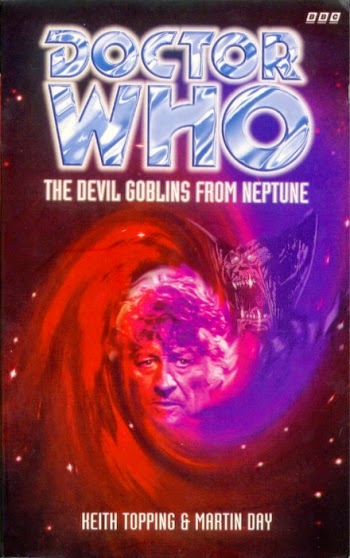A belated update! It's been a busy
few months at work, which has nothing to do with a certain frill-fronted
adventurer with a young-old face and a shock of white hair, so let's move on
with no further ado.
After the excitement of 'Inferno',
I was able to do something that viewers of the time could only dream of:
experience further adventures with the wonderful Elizabeth Shaw. Many years
after these stories were broadcast and enjoyed, fans of the show were moved to
write novel-length fan fictions which were published by Virgin Publishing and,
later, BBC Books.
Scales
of Injustice, by Gary Russell, was a so-called Missing Adventure published
in 1996, a long and involved look back to 1970s Who in the midst of its modern
revival in the form of Paul McGann; along with Russell's revisionist
fannishness of Silurian and UNIT history, not to mention the love-life of the
Brigadier, the arrival of Mike Yates and the big goodbye from Liz Shaw, this is
a novel with a strong engagement with 90s pop culture, showing the obvious
influence of The X-Files. (In the same way, Russell revived the 1970s Target
novel format for McGann's San
Francisco escapade.)
In a sense, this is a project of
reconciliation: the naivety of the 1970s with the paranoia of Chris Carter's
work, and the jarring 1980s approach to the Silurian culture with its original
1970s appearance. But it's a story about schisms and break-ups: the Brigadier's
family breaking up under the strain of the Official Secrets Act, the splinter
groups of angry reptiles, and the divisions within government concerning UNIT
and its approach to alien life. It's also a novel full of violence and
aggression - it is, perhaps, Russell looking back to the cosy world of Seasons
7 and 8 and asking, How could it be like that? We know life's not like that.
It's a belated bestowal of gravitas upon random cast changes and odd decisions
of monster costume.
I found the second half less
interesting than the build-up. Perhaps because the disparate elements of the
novel don't seem to integrate properly. They are, I suppose, creating the
perfect storm in which we can understand Liz Shaw leaving the Doctor. Perhaps,
in that at least, it succeeds - but it's a rather chilly story, ultimately. I
must admit to remembering very fondly the Terrance Dicks short story in a
Doctor Who Yearbook about Liz leaving UNIT, perhaps only because of a gorgeous
illustration by Phil Bevan.
A little later, but earlier for the
Doctor, came the BBC Novel The Devil
Goblins from Neptune by Martin Day and Keith Topping. This is a stylish
thriller pastiche with bags of atmosphere and retro scene-painting. Like
Russell, the authors play about a bit with the idea of UNIT and global
politics, and with a similar sense of reconciliation - but in a much more
mischievous mood - they tie together a lot of the random characters of early
1970s Who to suggest the crazy world of Who's Britain.
Russell's novel has a lovely, warm portrayal of the Third Doctor and some fun stuff for Liz to do - by contrast,
this novel has some fun action for the Doctor to get into, and some really
convincing character work for Liz: it really suggests the cool cynicism and wit
of the woman we see in 'Spearhead from Space', the character slightly diluted
in successive appearances (though back to the fore in 'Ambassadors of Death').
It's great that Russell's novel is
back in print, and I have cautious hopes that more of this era of Who (including The Devil Goblins) will
slowly become available once more, and perhaps be followed by new adventures in prose. Yes, we get more of the Third Doctor in these stories, more
of Liz Shaw too, but there are other interesting things going on too, with history, subversion, making connections, building background - sometimes
they don't quite work out, and to some readers they will seem eccentric
exercises, but to me they are a wonderful aspect of fan re-reading and
re-writing, critical and creative at once.
And I'd love to have a go, myself!
.jpg)


